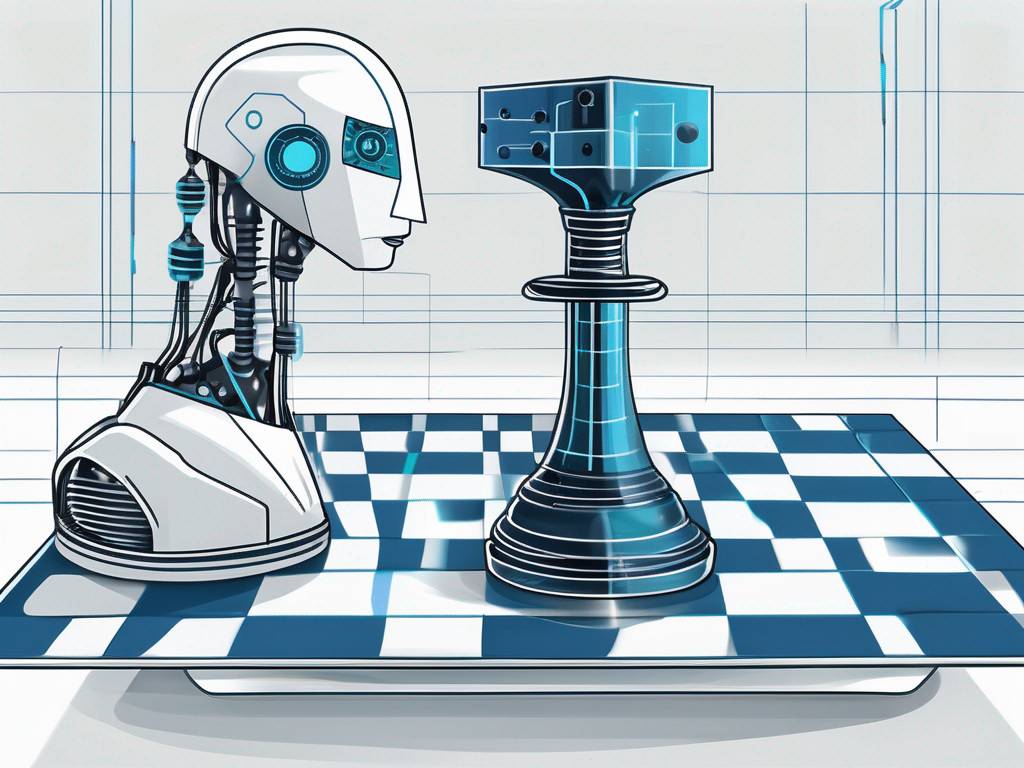AI Applications in Education: Revolutionizing Learning & Teaching
Key Insights
- AI in education enables personalized learning experiences for students, promoting better engagement and learning outcomes
- Intelligent systems and algorithms facilitate collaborative learning, fostering effective group work and knowledge sharing
- AI acts as a valuable teaching assistant, offering support to educators in grading, feedback, and individualized instruction
- The implementation of AI in education requires careful consideration of ethical concerns, such as data privacy and equal access to resources
AI, or Artificial Intelligence, has emerged as a powerful tool with the potential to revolutionize the field of education. With its ability to analyze patterns, process huge amounts of data, and provide personalized learning experiences, AI has the potential to transform the way both students and educators engage with educational content. In this article, we will explore the role of AI in education, its impact on learning processes and teaching methods, its applications in educational administration, and the ethical considerations that arise with its implementation.
Understanding the Role of AI in Education
The concept of AI is not new, but its relevance in education has gained significant prominence in recent years due to advancements in technology. AI refers to computer systems that can perform tasks that typically require human intelligence, such as learning, problem-solving, and decision-making. When applied to education, AI can provide tailored learning experiences, improve teaching methods, and streamline administrative tasks.
The Concept of AI & Its Relevance in Education
AI has the potential to address the diverse needs of students and provide personalized learning experiences. By analyzing data, AI systems can identify strengths and weaknesses in individual learners and adapt content accordingly. This personalized approach enhances student engagement and promotes better learning outcomes. AI can also automate repetitive tasks, allowing educators to focus on facilitating deeper learning experiences.
Imagine a classroom where every student has a virtual tutor, an AI-powered assistant that guides them through their learning journey. This virtual tutor can assess the student’s knowledge level, learning style, and preferences, and then tailor the curriculum to meet their specific needs. It can provide additional resources, practice exercises, and even real-time feedback to help the student grasp difficult concepts.
Additionally, AI can revolutionize assessment methods in education. Traditional exams and tests often fail to capture a student’s true understanding and potential. With AI, assessments can be more comprehensive and adaptive. AI algorithms can analyze a student’s responses, track their progress over time, and provide detailed insights into their strengths and areas for improvement. This data-driven approach to assessment can help educators make informed decisions about instructional strategies and interventions.
The Intersection of AI & Education: A New Era
AI presents a new era for education by offering transformative opportunities. It can seamlessly integrate with existing educational technologies, such as learning management systems and online platforms, to deliver customized learning experiences. Moreover, AI-powered platforms can provide real-time feedback, enabling students to identify areas for improvement and adjust their learning strategies accordingly.
Imagine a scenario where students are engaged in an online course, and an AI system is monitoring their progress in real-time. The AI system can analyze their performance, identify patterns, and offer personalized recommendations to enhance their learning experience. It can suggest additional resources, interactive simulations, or collaborative activities to deepen their understanding of the subject matter.
AI can also assist educators in designing and delivering effective instruction. By analyzing educational data, AI algorithms can identify the most effective teaching strategies for different learners. This data-driven approach can help educators create personalized lesson plans, select appropriate instructional materials, and provide targeted interventions for struggling students.
It is important to note that while AI has the potential to revolutionize education, it should not replace human teachers. The role of educators is irreplaceable in fostering critical thinking, creativity, and social-emotional skills in students. AI should be seen as a powerful tool that complements and enhances the teaching and learning process.
The Impact of AI on Learning Processes
Personalized Learning through AI
One of the most significant benefits of AI in education is its ability to deliver personalized learning experiences. By leveraging AI algorithms, educational platforms can analyze data and provide tailored content to each student. This personalized approach ensures that students receive targeted instruction, allowing them to progress at their own pace and focus on areas where they need more support.
For example, imagine a student named Emily who struggles with math. With the help of AI, the educational platform can identify her weaknesses and provide her with additional resources and exercises specifically designed to address those areas. This personalized learning experience not only boosts Emily’s confidence but also enables her to grasp mathematical concepts more effectively.
AI can also adapt to each student’s learning style, whether they are visual, auditory, or kinesthetic learners. By analyzing data on how students interact with the content, AI algorithms can tailor the presentation of information to match their preferred learning modality. This personalized approach enhances students’ engagement and retention of knowledge.
AI & Collaborative Learning
AI technology also has the potential to enhance collaborative learning. Through intelligent systems, students can engage in virtual collaborations, foster discussions, and work on group projects. AI algorithms can facilitate group formation based on students’ complementary skills and learning styles, leading to more effective collaboration and knowledge sharing.
For example, imagine a group of students working on a science project. AI can analyze their individual strengths and weaknesses and form groups that consist of students with diverse skill sets. This approach ensures that each group member brings unique perspectives and expertise to the project, fostering a more comprehensive understanding of the topic.
AI-powered virtual collaboration tools can provide real-time feedback and suggestions to students as they work together. These tools can identify areas where the group may be struggling and offer guidance or additional resources to help them overcome challenges. This collaborative learning experience not only promotes teamwork and communication skills but also encourages critical thinking and problem-solving abilities.
AI algorithms can also analyze the interactions and contributions of each student within the group, providing valuable insights into their individual strengths and areas for improvement. This data can be used by educators to assess students’ collaborative skills and provide targeted feedback for their future development.
The Influence of AI on Teaching Methods
AI as a Teaching Assistant: Pros & Cons
AI can act as a valuable teaching assistant, offering support to educators in various ways. Intelligent tutoring systems can provide instant feedback to students, allowing teachers to focus on individual student needs. This personalized approach to learning can greatly enhance the educational experience and help students achieve their full potential.
In addition to providing feedback, AI can also assist in grading assignments, saving teachers valuable time and effort. By automating the grading process, AI can provide quick and accurate assessments, allowing teachers to focus on other important aspects of their work.
However, concerns have been raised regarding the potential replacement of human instructors. While AI can provide valuable support, it is important to maintain a balanced integration of AI in teaching methods. Human instructors bring a unique set of skills and qualities to the classroom, such as empathy, creativity, and adaptability, which cannot be replicated by AI.
The use of AI as a teaching assistant raises ethical considerations. It is crucial to ensure that AI systems are designed and implemented in an ethical and responsible manner, taking into account issues such as privacy, bias, and transparency. Educators and policymakers must work together to establish guidelines and regulations to ensure the ethical use of AI in education.
Transforming Curriculum Planning with AI
AI tools can analyze educational content, enabling educators to identify knowledge gaps, update curriculum materials, and design learner-centered experiences. By leveraging AI in curriculum planning, educators can ensure that the content remains relevant, up-to-date, and aligned with students’ needs and interests.
With the help of AI, educators can gain valuable insights into student learning patterns and preferences. By analyzing data on student performance and engagement, AI can provide recommendations on how to improve curriculum design and delivery. This data-driven approach can lead to more effective teaching methods and better learning outcomes for students.
AI can also assist in the creation of personalized learning experiences. By analyzing individual student data, AI can tailor educational materials and activities to meet the specific needs and interests of each student. This personalized approach can enhance student engagement and motivation, as well as foster a deeper understanding of the subject matter.
However, it is important to note that AI should not replace human expertise in curriculum planning. While AI can provide valuable insights and recommendations, it is essential for educators to use their professional judgment and experience to make informed decisions. The integration of AI in curriculum planning should be seen as a tool to support and enhance the work of educators, rather than replace them.
AI in Educational Administration
Streamlining Administrative Tasks with AI
AI has the potential to streamline various administrative tasks in educational institutions, such as data entry, scheduling, and resource allocation. By automating these tasks, educators and administrators can save time and redirect their efforts towards more strategic initiatives, ultimately improving the overall efficiency of educational institutions.
AI in Decision Making: Enhancing Educational Policies
AI technologies can assist decision-makers in the education sector by providing data insights and predictive analytics. By analyzing large datasets, AI can identify patterns and trends, enabling leaders to make informed decisions regarding educational policies, resource allocation, and curriculum development.
Ethical Considerations of AI in Education
Data Privacy & Security in AI-Driven Education
The implementation of AI in education raises concerns regarding data privacy and security. As AI systems collect significant amounts of student data, it is crucial to ensure that this information is protected and used ethically. Educational institutions must establish robust policies and frameworks to safeguard student privacy and maintain data security throughout the AI implementation process.
Ensuring Equal Access to AI in Education
Another ethical consideration is the need to ensure equal access to AI-driven education. AI technologies should not widen the existing educational inequalities, but rather be used as tools to bridge the gap. Efforts must be made to provide equal access to resources and opportunities, ensuring that AI benefits all learners, regardless of their socioeconomic background.
In conclusion, AI applications in education have the potential to revolutionize learning and teaching processes. By leveraging AI’s capabilities, educators can provide personalized learning experiences, enhance teaching methods, streamline administrative tasks, and make informed decisions regarding educational policies. However, it is crucial to address ethical considerations and ensure that AI is implemented in a manner that promotes equal access and protects student privacy. As executives, leaders, and decision-makers in the education industry, understanding the role of AI in education and its implications can guide strategic planning and facilitate the implementation of AI-driven initiatives that will shape the future of learning and teaching.

 hello@westlink.com
hello@westlink.com  (866) 954-6533
(866) 954-6533  700 N Colorado Blvd,
700 N Colorado Blvd,







Comments